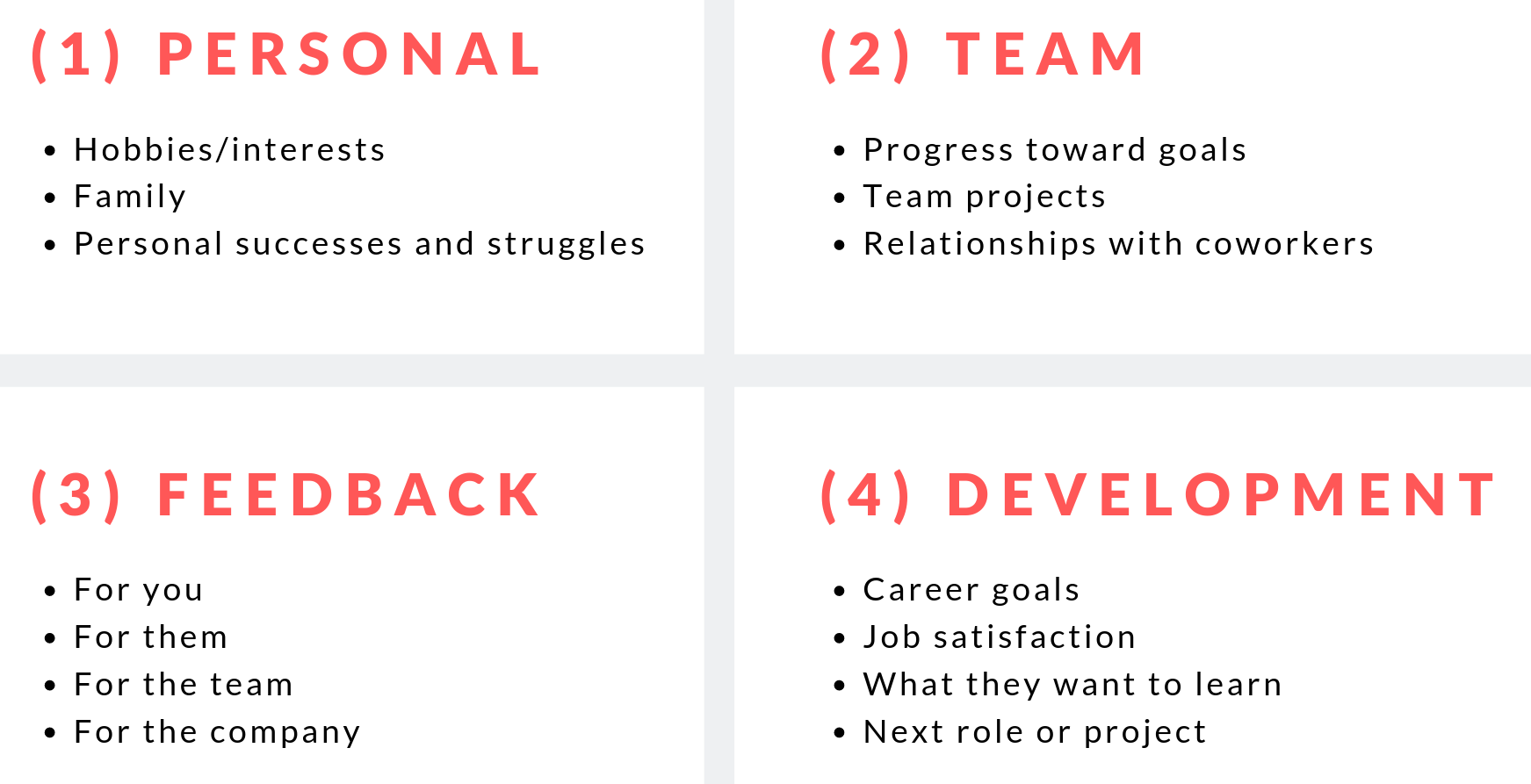How to Lead Better 1-on-1s with Your Employees
If you’re new to management, you may wonder whether 1-on-1 meetings are worth the time and effort.
After all, it takes a lot of time to meet personally with each member of your team, and it’s possible that you haven’t seen effective 1-on-1s modeled by your past managers.
However, if you can master the art of 1-on-1s, they will offer your best opportunity to get to know your employees, build mutual trust, and discuss topics that don’t arise every day (e.g. personal goals, career path, job satisfaction, etc.).
There are three primary purposes of 1-on-1s:
- Build a relationship between you and the team member
- Find out how you can support the team member
- Help the team member grow
How Often Should You Meet with Each Employee?
Prioritize individual time with each team member and try to avoid canceling 1-on-1s at the last minute. Frequently canceling 1-on-1s sends a message that those meetings aren’t important to you.
Work with each team member to decide how often you’d like to meet. Generally, it’s ideal to meet once every 1–2 weeks, typically for 30–60 minutes. Opt for more frequent and/or longer meetings if you and/or the team member are new to your respective roles since you’ll need more time to build rapport and trust with one another.
Once you get into a groove and have established a relationship, you can scale back your meetings as necessary. Keep in mind that more senior team members typically need less 1-on-1 time.
Who Should Run the Meeting?
Many people believe the direct report should run your 1-on-1s to ensure they’re getting what they need from you. Having the team member lead the meeting also puts the onus on them for their personal development, which is a good idea because it ensures the team member is accountable for their own growth.
However, as with so many things in leadership, there’s no “right way” to do 1-on-1s. Whatever you decide, be explicit with each team member about which of you will be setting the agenda and running the meeting.
Regardless of who runs the meeting, block out time to prepare in advance. When you’re just starting to have 1-on-1s, you may want to set aside 15 minutes to prepare. During this time, focus on the questions you want to cover in the meeting.
Come to the 1-on-1 with questions, but yield to the team member if they have things they need to discuss. Let them do most of the talking while you play a supportive role in the conversation by listening and asking thoughtful questions. If you like, you can always provide more structure or even introduce a few standard topics for every 1-on-1. Kim Scott, author of Radical Candor, asks her direct reports to structure 1-on-1s around four questions:
- What’s on your mind this week?
- How happy were you this past week?
- How productive were you this past week?
- What feedback do you have for me?
If you’re new to leading 1-on-1s, consider starting with questions like these and adapting them to suit your specific preferences and goals.
How Honest and Vulnerable Should You Be?
If you ask generic questions in your 1-on-1s, you’re going to get generic answers. For instance, if you are worried your team member may be getting burnt out from working long hours, don’t ask, “How are things going?” That question will undoubtedly yield a blasé response like “Good,” and the discussion will end there. If you’re curious about burnout, ask a direct question like “How many hours did you work last week?”
By leading with sincere, direct questions, the team member will understand that you expect a direct response. Follow up by asking how you can support them and offering help as needed. Team members want to know you’re aware of their struggles and willing to help.
Be vulnerable and encourage vulnerability. Vulnerability helps you connect with your team in a genuine and personal way. It leads to stronger manager-employee connections and greater empathy about personal struggles.
Leading with vulnerability means embracing uncertainty and emotional exposure. Vulnerability is admitting, “I don’t know” instead of pretending you do. Vulnerability is accepting tough feedback from a team member and asking them and the rest of the team to hold you accountable to improve.
Vulnerability also helps deepen relationships. If you’re having trouble connecting with a team member, talk about a problem you’re personally facing that has stumped you. Ask for their help. Vulnerability encourages vulnerability. Open up to them and they’ll be more likely to open up to you.
“Vulnerability doesn’t come after trust — it precedes it. Leaping into the unknown, when done alongside others, causes the solid ground of trust to materialize beneath our feet.” -Daniel Coyle
What Topics Should You Discuss?
Avoid using your 1-on-1s to get and give status updates. While a few day-to-day topics will always arise in 1-on-1s, the primary focus should be strategic issues and questions that don’t surface every day.
Keep an eye out for these warning signs that may signal your 1-on-1s have become too focused on status updates:
- Your team member makes comments like, “Can we cancel today’s 1-on-1? I have no updates to share with you today.”
- Your 1-on-1s feel boring and stale.
- You don’t know your team member’s career goals.
- You can’t remember the last time you and the team member talked about something they want to learn or do.
To help guide your questions during 1-on-1s, consider using the following “4-Square” to help you think of topics to discuss.

There’s no formula for what these discussions should look like, but this tool will help you learn about each aspect of your team member’s life and work. Some managers talk about a little of everything in every meeting, while others only talk about strategic questions like career development on a monthly or quarterly basis.
Here is a list of potential questions to help you dig into each area of the 4-Square.
1. Personal Questions
- What are your favorite hobbies outside work?
- Which recent accomplishment are you most proud of?
- What are the things that worry you?
2. Team Questions
- Whom do you admire on the team and why?
- What things are you doing that you would like to stop doing or delegate to someone else?
- What would you say are our team’s three biggest priorities right now?
3. Feedback Questions
- If you were me, what would keep you up at night?
- What can I do to be a better manager for you?
- What’s the most de-motivating thing I’ve done to you in the past few months?
4. Development Questions
- What are the things you’re most passionate about? Is there a way for us to structure your work more around those passions?
- What are the things you most want to learn in the next three months?
- What do you envision as your next role or responsibilities?
Remember, there are many ways to conduct 1-on-1s. As long as you strive for direct communication, honesty, and vulnerability, you will be on your way to effective conversations.
Additional Resources
- Radical Candor by Kim Scott
- Fierce Conversations by Susan Scott
- The Coaching Habit by Michael Bungay Stanier




